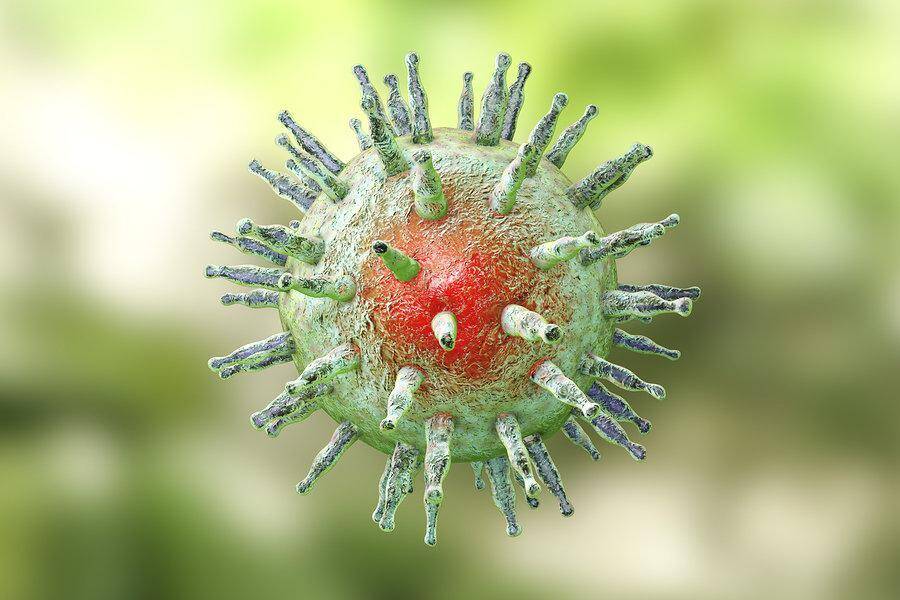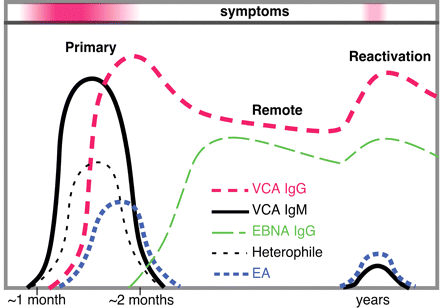GUEST POST: Is Reactivated Epstein-Barr Causing Your Chronic Fatigue Syndrome? Here is How To Tell (And What To Do About It)
Today I have a special guest, a very passionate functional medicine colleague who helps women with chronic fatigue syndrome reclaim their energy, joy & clarity so they can truly thrive again. She has been generous to share with us this great information, my hope is it can benefit you or someone you love who is challenged with Chronic Fatigue Syndrome! Here’s Laura!

Hey there! My name’s Laura. I’m a certified functional medicine practitioner over at www.lauraditri.com and I specialize in helping women fully recover from Chronic Fatigue Syndrome (CFS) and get their lives and their health back.
Some research has suggested reactivated Epstein-Barr Virus plays a role in CFS, although findings are somewhat controversial. Clinically, however, I find reactivated EBV is at least partially responsible (and sometimes completely responsible) for CFS in around 30% of the women I work with.
Epstein-Barr is the virus that commonly causes mononucleosis, a.k.a. “mono” or glandular fever, but it can stay in the body and silently wreak havoc long after the mono phase is over. This virus can live in someone for decades, sneaking in and out of activity because of stress or other imbalances in the body.
Reactivated Epstein-Barr can cause
- fatigue/exhaustion
- anxiety and depression
- systemic inflammation
- muscle and joint pain
- brain fog
- swollen glands in the neck
- Hashimoto’s or hypothyroidism
- and it is linked to multiple other autoimmune diseases and even certain cancers
Reactivated EBV is often misdiagnosed. New research shows a link between reactivated EBV and fibromyalgia, Lyme disease, and possibly chronic fatigue syndrome.
By the time you are done reading this article, you will know exactly how to test for Epstein-Barr and interpret your results AND you’ll also learn my tried-and-true strategies for recovering.
First, talk with your doctor or practitioner about getting a lab that shows all four EBV antibodies. These antibodies include EBV VCA IgG, EBV VCA IgM, EBV EBNA IgG, and EBV EA IgG.
If you aren’t currently working with a doctor, you can order this full panel from http://www.walkinlab.com
So as to not overwhelm you, I’m going to add this in as a side note: It’s possible to get a “false negative” on your results if your total immunoglobulin G + M are less than normal. You can foolproof this a bit more by asking your doctor to order “Quantitative Immunoglobulins G + M” to add to your panel. This is how I order it in my clients so we make sure results are that much more accurate.
Interpretation of the EBV blood test in the way I’ll describe is pretty accurate, but not 100% accurate according to the medical literature. There are no definitive results when it comes to most lab tests, but these four antibodies give us a pretty good picture.
Once you have your results back, take a look at this chart from Newfoundland and Labrador Public Health Library:
You want to pay attention to “reactivation” on the right-hand side. The EA IgG (blue dotted line) is the most important ones to look at in terms of reactivated EBV. It has been shown to be elevated in 10 out of 11 cases of reactivated EBV. Its possible yet rare that EA can be negative, however, and there will still be a chronic infection.
I find VCA IgM is rarely raised in reactivation and is usually raised in initial infection only (mononucleosis/glandular fever).
A typical picture of reactivation will be elevated EA IgG, VCA IgG, and EBNA IgG.
A less typical picture of reactivation will be either the VCA IgG or the EBNA IgG markers (or both) being above 100 U/mL, and the EA IgG and VCA IgM markers being in normal range. This generally means the testing was done in a “lull” phase of reactivation but the virus is prone to reactivating. I would still recommend using anti-viral herbs and supplements, as many with this picture feel infinitely better once they follow an anti-viral protocol for a few months.
Also keep in mind that the EA IgG marker is also elevated in 20 – 30% of patients that are perfectly healthy now but did have a past Epstein-Barr infection like mononucleosis. If you’re reading this article and ordering this test because you have EBV symptoms, you’re likely not in this 20 – 30%… but it’s still good to keep this in mind for re-testing.
Which Supplements And Herbs Get Rid Of EBV?
Now that you know if you’re likely dealing with reactivation of EBV, let’s take a look at specific, scientifically studied botanicals and supplements to help get rid of it.
Note that the goal of recovering from reactivated EBV is to get the virus to go back into a “dormant” state.
Multiple different vitamins and minerals have scientific links showing their benefit to boosting up the immune system to attack viruses. These include vitamin A, D, methylated B12, C, and zinc.
The best direct anti-viral herbs and supplements for EBV include boswellia, turmeric, ginger, licorice (not DGL), selenium, alpha lipoic acid (caution if you have amalgam/mercury fillings), CBD oil, baicalin/Chinese Skullcap, passionflower, reishi, berberine, and lysine.
The best herbs and supplements to support methylation and detoxification for EBV include Hawaiian spirulina, NAC, P5P, and methyl groups such as SAMe, methyl-, adenosyl-, and hydroxycobalamin.
I generally recommend incorporating standard daily values of vitamin A, D, and zinc, although more may be needed if a blood test shows a deficiency. If alkaline phosphatase (part of a standard blood test) is lower than 70 u/l, that is generally a fairly good indication of zinc deficiency. I recommend incorporating fairly large doses of vitamin C and B12 as they are water soluble and can be taken in higher concentrations than vitamins A and D without risk of toxicity.
For the direct anti-viral herbs and supplements, I recommend starting with a heavy dose of 3-5 of these products and rotating or adding in as you recover.
Supporting methylation and detoxification is usually necessary as genetics play a role in these processes as well. It’s especially important if you have the MTHFR gene. So as not to overdo it with supplements, I generally recommend just 1-2 of the methylation & detoxification products at a time.
Foods To Eat & Not To Eat
For reactivated EBV, one of the most import things you can do is to follow a no-egg anti-inflammatory diet.
Inflammation causes stress. Stress wreaks havoc on the adrenals. When the adrenals are in bad shape, the immune system takes a hit, and EBV is more prone to becoming out of control.
My favorite anti-inflammatory diet is what I like to call a “high-vegetable” gluten-free & dairy-free diet. I recommend at least four cups of vegetables per day, as their high antioxidant content is important for normalizing detox processes in the body. If tolerated raw, the beneficial soil-based microorganisms found on them will help to repopulate the microbiome of the digestive tract as well. I also recommend staying away from eggs, as EBV increases the likelihood of egg allergies.i
Go organic. Especially for meats and animal products. Organic food has been proven to be much more nutrient and antioxidant denseii than non-organic food. This is incredibly important to heal the cellular processes of the body, not to mention the relief your detox pathways will feel when they don’t have to detox and process pesticides and herbicides.
Organic, grass-fed, and free-range meats and animal products have a completely different nutrient and omega profile than conventionally raised animal products, and generally tend to be anti-inflammatory (as opposed to conventionally raised animal products which tend to be pro-inflammatory).
It’s incredibly important to note that “killing” the EBV virus is just the first step. The bigger picture is bringing your body back into a state of balance so the immune system isn’t compromised and the EBV doesn’t take over again. In the greater picture of so many conditions that tend to have “layers” like chronic Lyme, reactivated EBV, adrenal fatigue, hormone imbalance, and Chronic Fatigue Syndrome (CFS), its incredibly important to make sure not only are you killing the bad guys, but also supporting detox and methylation pathways, understanding if gut bugs are present, if environmental or mold illness is a factor, if food allergies are present, if autoimmunity against the thyroid or other organs is at play, and if there’s systemic inflammation that’s halting the healing process.
Reactivated EBV can start to turn around in as little as 2 weeks, although many need a longer-term program that lasts multiple months to notice a huge difference. If you are on the right track, you should see your antibodies decrease after 2 months.
After this time, go back to step one and retest yourself for EBV antibodies. If you’re moving in the right direction, your antibodies (ANY of the four) should go down. Of course, the most important part is to get you feeling radically better, but seeing absolute proof that what you are doing is working can be a wonderful support!
As with any advice you read on the internet, this info is for educational purposes only. Before implementing any changes in your diet/lifestyle/supplement routine, be sure you talk with your own doctor to understand if these suggestions are appropriate for you.
All the best in your radical recovery from reactivated EBV,
Laura
www.lauraditri.com
References:
1 Loebel (2014) Deficient EBV-specific B- and T-cell response in patients with chronic fatigue syndrome.
https://www.ncbi.nlm.nih.gov/pubmed/24454857
2 Fagundes (2014) Attachment anxiety is related to Epstein-Barr virus latency.
https://www.ncbi.nlm.nih.gov/pubmed/24945717
3 Esterling (1993) Defensiveness, trait anxiety, and Epstein-Barr viral capsid antigen antibody titers in healthy college
students. https://www.ncbi.nlm.nih.gov/pubmed/8500440
4 Onozawa (2017) Inflammatory cytokine production in chronic active Epstein-Barr virus infection.
https://www.ncbi.nlm.nih.gov/pubmed/28381684
5 Janegova (2015) The role of Epstein-Barr virus infection in the development of autoimmune thyroid diseases.
https://www.ncbi.nlm.nih.gov/pubmed/25931043
6 Samson (2017) Local Doctor Gives Hope To Fibromyalgia Sufferers http://www.14news.com/story/2271049/localdoctor-gives-hope-to
fibromyalgia-sufferers (article, not a clinical study)
7 Pavletic (2017) Early Disseminated Lyme Disease Causing False-Positive Serology for Primary Epstein-Barr Virus
Infection: Report of 2 Cases. https://www.ncbi.nlm.nih.gov/pubmed/28379435
8 Harley (2018) Transcription factors operate across disease loci, with EBNA2 implicated in autoimmunity
https://www.nature.com/articles/s41588-018-0102-3
9 Henle (1981) Epstein-Barr virus-specific serology in immunologically compromised individuals.
https://www.ncbi.nlm.nih.gov/pubmed/6272966
10 Mora (2010) Vitamin effects on the immune system: vitamins A and D take centre stage.
https://www.ncbi.nlm.nih.gov/pmc/articles/PMC2906676/
